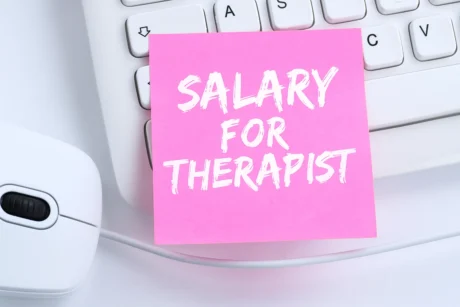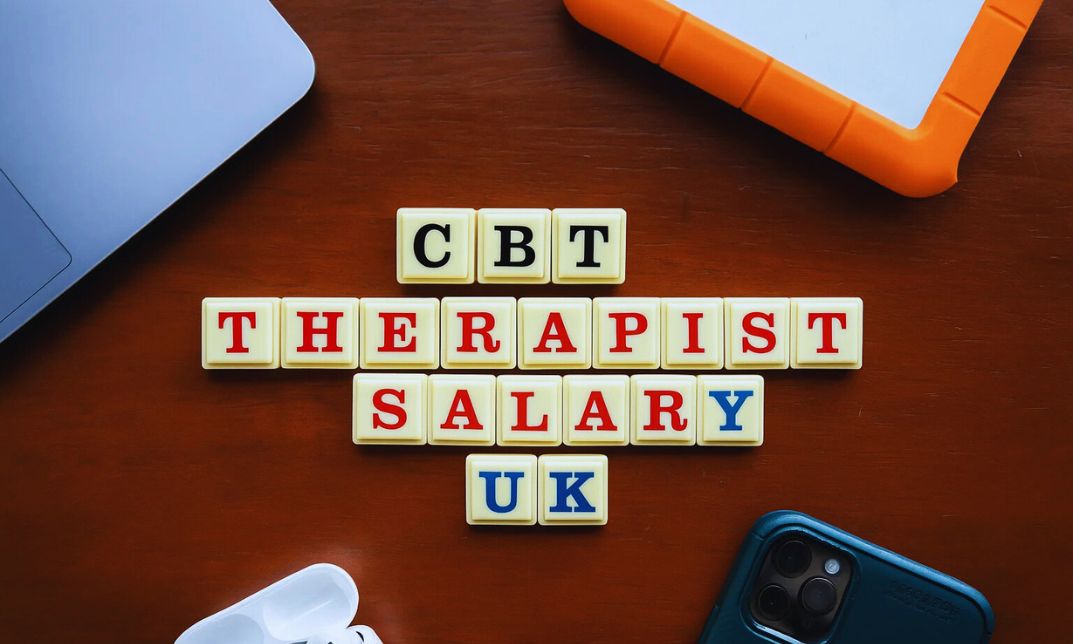No products in the basket.
If you’re thinking about a career as a therapist, here’s what you need to know: The typical salary for a therapist in the UK sits in NHS Bands 5–7 (£31k–£55k), while private sessions usually charge £60–£120+. As demand keeps rising, pay is nudged up a bit. Still, local budgets and how services are commissioned largely decide how fast salaries grow, so it’s worth keeping an eye on opportunities and changes in the sector.

In this blog, we’ll explore what’s driving demand, where salaries are heading and the tips you can use to boost your earning potential as a therapist.
Why There’s More Need for Therapists Today
Right now, therapists are needed more than ever. More people are asking for help, and stress at work and in daily life keeps growing. On top of that, referrals and contacts are much higher than before the pandemic. For example, urgent cases for children and young people are rising, and many workplaces are turning to Employee Assistance Programs more than before. All of this shows that therapists play a bigger role than ever in helping people feel supported and cope with challenges.
What the Latest UK Data Shows
- NHS Talking Therapies runs 10% more courses than before the pandemic.
- Referrals jumped from 1.1M in 2013/14 to 1.9M in 2025.
- Overall mental-health referrals hit 5.2M in 2024, up 38% vs 2019.
Demand is clearly rising, making therapists more important than ever.
Source: NHS England
Where Demand Is Hottest

High-demand areas for therapists include:
- Children & Young People (CYP): Urgent referrals keep rising, especially for post-pandemic anxiety, self-esteem issues, and exam stress.
- Primary Care: Patients struggling with anxiety, depression, and long-term health conditions are being referred more frequently.
- Workplaces/EAPs: Employers report higher staff stress and are using more therapy blocks to reduce absenteeism and burnout.
- Post-Trauma & Crisis Support: Demand is growing for therapists who can support people affected by major incidents, grief, or community trauma.
- Neurodiversity Support: More adults and children are seeking assessments and ongoing therapy for ADHD, autism, and related needs.
- Digital Therapy Platforms: Online therapy services and telehealth are expanding fast, creating steady opportunities for therapists comfortable with remote sessions.
These areas under pressure also influence pay growth for therapists.
Salary for Therapist: What You Can Expect in 2025/26

If you work in the NHS, most therapist roles sit in Bands 5–7, while senior positions can reach Band 8a, with London usually adding a bit extra. On the other hand, private practice sessions normally charge £60–£120+, depending on where you are and your specialism. Keep in mind that month-to-month income can change because of cancellations and costs like room hire or supervision. So, while the fees look good on paper, actual take-home pay can vary.
What Could Make Therapist Pay Go Up in 2026
Here are some simple reasons why therapist pay might rise next year:
- More People Need Therapy: As more people ask for help, bosses may offer higher pay to keep good therapists.
- More Jobs for Therapists: When services hire more people, they have to compete for staff, which can push wages up.
- Deadlines for Appointments: The NHS wants people to be seen within certain weeks. To meet these times, they may pay more to keep enough staff.
- Yearly NHS Pay Checks: Each year, the NHS reviews pay and sometimes gives a raise.
So, when many people need therapy and services are under pressure, pay often goes up too.
What Can Hold Pay Back
Even though demand for therapists is rising, pay doesn’t always go up quickly. For example, local budgets and the way services are funded can slow increases. On top of that, service changes and staff leaving the profession can make it harder for higher demand to turn into higher pay. So, while the need is there, salaries don’t always rise as fast as we might hope.
Online Therapy in the UK: Now Mainstream
During the pandemic, telephone and video therapy grew really quickly—and they’re here to stay. These days, lots of therapists offer online sessions as a normal part of their work.
On top of that, UK telehealth services are still growing, which makes it much easier for people to find help no matter where they live. Online therapy is especially helpful for:
- People in remote areas: They can get support without a long trip.
- Busy workers or parents: It’s easier to fit a video call into a tight schedule.
- Clients with mobility or health issues: They can get therapy safely from home.
- Younger clients: Many young people feel more comfortable talking online.
Some therapists even mix online and face-to-face sessions to give clients more choice. And with secure video platforms and better internet access, online therapy has become a trusted, everyday option across the UK.
Does Online Therapy Pay More?
Online therapy can sometimes bring in extra money. For example, you can reach clients from higher-paying areas or niche language groups. Plus, fewer no-shows and flexible hours make it easier to manage your schedule. However, there are costs too, like platform fees, marketing and the need for proper supervision. So, while online work can help your income, it isn’t always simple or guaranteed.
Employers & EAPs Are Part of the Story
Workplaces are playing a bigger role in the demand for therapists than ever before. For instance, the use of Employee Assistance Programs (EAPs) has risen above historic averages. Plus, more employers are paying for short therapy sessions for their staff. Because of this steady support, therapists see consistent demand which helps keep their work in high demand.
Which NHS Therapist Roles Are in Demand
Here are the NHS therapist roles that are in high demand right now:
- CBT / High-Intensity: usually Band 5–7, senior posts at 8a
- Counselling / Psychotherapy: Band 5–7, senior 8a
- Trauma / EMDR: Band 5–7, senior 8a
- Children & Young People (CYP) Therapy: Band 5–7, senior 8a
- Primary-Care Mental Health: Band 5–7, senior 8a
These roles are where therapists are needed most, so if you’re thinking about your next step, this gives a clear picture of the opportunities waiting in the NHS.
Private Practice (Fees vs Take-Home)
Private practice fees can sound really tempting, but what you see isn’t always what you earn. You still need to cover things like room hire, supervision, CPD, insurance, marketing, and any missed sessions. On the other hand, NHS jobs give more security, with steady pay and a pension—so it’s worth thinking about the trade-offs before you decide.
Geography & Niche
Therapist pay can vary greatly depending on location and speciality. For example, London and the South East usually offer higher rates. Working in niche areas like OCD, trauma, or CAMHS—or taking corporate contracts—often brings in better fees. So, it’s clear that where demand is strongest and therapists can earn more.
Tips to Boost Your Therapist’s Salary
Even though demand is rising, there are ways to earn more and grow in your career. Here’s how:
- Focus on high-demand areas: Specialise in things like trauma, OCD, children’s mental health (CAMHS), or workplace stress. Fewer therapists do these, so pay is often higher.
- Get experience: More years and extra training can help you earn more in NHS roles or charge higher rates in private practice.
- Think about location: London and the South East usually pay more, while smaller towns may pay less.
- Mix NHS and private work: Doing both can raise income, but plan your schedule and costs carefully.
- Keep learning: Accredited courses and CPD training make you more valuable and let you offer popular therapy types.
- Use online therapy: Video or phone sessions reach more clients, save travel time, and give flexible hours—but remember platform fees and supervision.
By following these tips, you can use your skills better, meet the growing demand, and increase your salary for therapist.
Start Here If You’re New
If this rising demand has got you curious, there are lots of ways to get started. For example, you can take accredited and CPD courses to build core skills and learn in-demand therapies. Plus, it’s a low-pressure way to try out both NHS and private career paths while you figure out what feels right for you. And for all this support, guidance, and courses in one place, Course Cave is a great option.
Also, if you’re also curious about what therapists actually earn in the UK, you can check out our detailed blog: “How Much Do Therapists Make in the UK?”
Digital Practice Essentials
Working online as a therapist can be really convenient but it comes with its own rules. For example, you need to keep clear clinical boundaries, use secure platforms, get proper consent, protect client data and make sure supervision fits remote work. By following these steps, you can keep your online practice safe, professional, and high-quality.
FAQs
- What is the salary of a therapist in the UK?
NHS roles are usually Bands 5–7 (£31k–£55k). Private sessions charge £60–£120+, but take-home pay varies.
- What is the highest paid therapist?
Senior NHS roles (Band 8a) and private therapists in niche areas earn the most.
- Is therapy a well-paid job?
It can be, especially in senior NHS roles or private niche work, but private income can vary.
- What GCSE do I need to be a therapist?
Usually, English and Maths are required, and some courses may ask for Science too.
- Do you need a university degree to be a therapist?
Most therapy roles require a degree in psychology, counselling, or a similar field.
- Is it hard to become a psychologist?
It’s a challenge because of the degree, postgraduate training and supervised practice, but with dedication, it’s definitely possible.
Final Thoughts
The salary for therapist in the UK reflects growing demand, with NHS Bands 5–7 being common and private fees ranging from £60 to £120+. While pay depends on your experience, specialism and location, the need for skilled therapists has never been higher.
If you want to boost your skills and start your therapy journey, try Course Cave’s flexible, accredited Cognitive Behavioural Therapy Training Online for both NHS and private roles.



